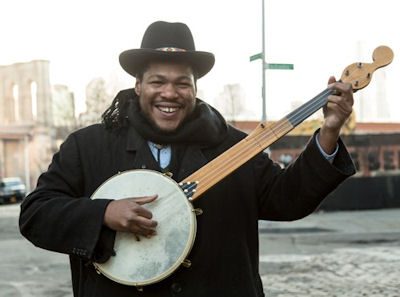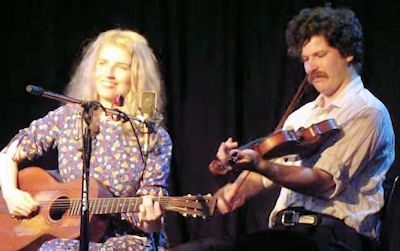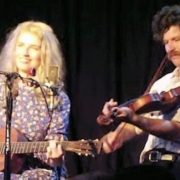“BLIND BOY” PAXTON AND AXELROD AND FAIRFIELD IN CONCERT
Jerron “Blind Boy” Paxton in Concert
With Frank Fairfield and Meredith Axelrod
At Cody’s Viva Cantina in Burbank – January 14, 2017
~1~
 “Never was a white man had the blues.” ~Lead Belly
“Never was a white man had the blues.” ~Lead Belly
The black songster (he resists the label “blues singer”) Jerron “Blind Boy” Paxton is just twelve days shy of his 28th birthday—and it can’t happen too soon for me.
Robert Johnson, the King of the Delta Blues, recorded his legendary twenty-nine tracks in 1936 and 1937. The following year, at age 27, he was dead, poisoned by the husband of the wife with whom Johnson was cheating on his own wife. He was a member of the ill-fated star-crossed cursed “27 club” which included Janis Joplin, Jimi Hendrix, Jim Morrison and Tim Hardin—all from heroin addiction.
No major reputation in music has been built on a smaller recorded legacy. Perhaps because they include the founding myth of his unparalleled career—Crossroads—in which he claimed to have sold his soul to the devil at the crossroads of Highway 61 and Highway 49 in the Mississippi Delta, in exchange for making him a great blues guitarist. His songs have merged into mystery and magic—whereby educated listeners have been convinced that they were listening to two guitarists playing his songs—one playing bass and one playing treble—when it was Robert Johnson himself playing finger-style blues guitar. To my mind he wrote the greatest couplet in blues literature: “Hellhound on my trail/Blues coming down like hail.”
So when I was invited by my editors to attend Jerron “Blind Boy” Paxton’s debut concert in Los Angeles—at the small but devoted and dedicated folk music haven in Burbank—the Mexican restaurant Cody’s Viva Cantina—I couldn’t resist. I knew Paxton (no relation to Tom) was only 27 and already spoken of with superlatives by reviewers as far from the center of blues culture as The Wall Street Journal—how could I? It was well worth the trip.
What I didn’t know was that he is both black and Jewish (on his mother’s side)—until I noticed the yarmulke in one of his YouTube videos (“Broke and Hungry Blues”). He made his faith clear and an on-going part of his show by referring a number of times to various foods in his roots-based set of songs from the 1920’s and earlier as “non-Kosher.” But he also affirmed directly that he was Jewish—and not in Sammy Davis’ sense as having married into the faith. With so many white Jewish blues singers in the folk music revival (Roy Book Binder, David Bromberg, Stefan Grossman and Bob Dylan to mention a few I have reviewed in these pages) I was happy to see one who is black.
That Paxton is also blind, and emphasizes it by putting it in his name, in the well-known tradition of Blind Lemon Jefferson, Blind Blake and Blind Willie McTell, made him all the more inviting and intriguing. You don’t adopt a moniker like that unless you are supremely confident of your abilities—so as to avoid invidious comparisons with the greatest of the great. “Blind Boy” Paxton is in good company, and as Muhammad Ali once said, “It ain’t braggin’ if it’s true.” “With a name like Smuckers it has to be good.”
I’m here to tell you, it’s true. Jerron “Blind Boy” Paxton, as my recording engineer Scott Fraser commented after we watched a couple of his YouTube performances, “is the real deal.” Like Ray Charles and Doc Watson, Paxton was not born blind. He started going blind at the age of 16, so he remembers a sighted world, and even today is not completely blind. But he is blind enough that you notice when he sings his eyes are turned within and his audience contact is brilliantly maintained not because he looks at you and sees you, but because he reaches out to you with every fiber of his being—his dazzling smile indeed is the gateway to his heart—each song grabs you from the first note and doesn’t let go.
Paxton is a virtuoso on each instrument he plays: Guitar, banjo (his first serious instrument), violin and harmonica. He plays them all and more—including piano—and each one stops the show—that’s how good he is. His harmonica playing is what most captivated me, since I have never heard a harmonica player who truly put me in mind of Sonny Terry, the harmonica player against whom all must be measured. Blind Boy Paxton can make any human sound come out of his harmonica—and some nonhuman as well, including a wild train steam whistle that pulled the audience out of our seats—it was mind-blowing and breath-taking. That’s entertainment!
When he picks up the antique black slave (who invented the instrument) era banjo—that looks nothing like any banjo you would associate with Pete Seeger or Earl Scruggs—you are carried back in time to the earliest roots of what is now politely called “Americana Roots Music” except that what Paxton plays is the real thing—with heart pounding bass notes that are equally powerful to the hallmark sparkling sound of the modern bluegrass or even clawhammer banjo heard at most folk festivals. You see the nearly forgotten—but for a musician with the authentic sensibility of “Blind Boy” Paxton—black minstrel performers—and important to distinguish, not “black face” minstrels, but African-American folk artists of the highest caliber—as the lead photograph on Mr. Paxton’s web site, a group shot that makes you wonder, “Where has all this music gone?” Wonder no further; they are in the loving and capable hands of a modern master—“Blind Boy” Paxton, who has recaptured the durable and timeless sound of a bygone age—with songs that tell of their pain-filled and hard fought plantation lives for survival in a land that exploited them and threw them away, or worse.
Paxton’s most moving song—to these old ears—was one such extended narrative (he rightfully called “the saddest song I can think of”) of a Virginia slave named “Lorena” who somehow escapes so she “will no longer have to support my master/And no more have to wear these chains.” It’s a devastating reminder of the world no one wants to be reminded of anymore, but which Paxton takes to heart and even comments that it might “anger white folks who can’t afford to call me “Boy,” showing that he is well aware of the demeaning evocations his nickname also hints at, the Black Boy of novelist Richard Wright’s kunstlerroman. The illuminating and sad fact that there was not even one black person in the audience—when the back listening room of the restaurant was packed with eager white folk fans—reveals all too clearly how far removed we are from the Roots that the phrase “Americana roots” music leaves out—and that is the Roots of Alex Haley’s masterpiece which connected contemporary black families to their slave ancestors.
Here we have a great black modern musician, who has painstakingly recreated the music of perhaps ten generations of his forebears. Viva Viva Cantina! I say — for being the up and coming folk venue in Los Angeles and introducing this Paxton to Southern California. The other Paxton, by the way, will be returning to McCabe’s on Saturday April 1—after announcing his retirement two years ago at his last concert there on September 11, 2015. I guess The Full Employment Act for Folk Singers—Donald Trump—has lured Tom out of retirement.
Well pay attention, McCabe’s: there is another Paxton in town (he was born in South Central)—and he would grace your stage with the music and storytelling of the unheard sources of what passes for “folk music” nowadays—the music that audiences in Paris—who celebrated the great Big Bill Broonzy and the country blues he carried on before we here in America knew who he was, because here in America all Big Bill could hope to be was the campus janitor at the University of Illinois. And then he had the misfortune to die in 1958, just five years before the folk revival would have brought him to national attention along with Mississippi John Hurt and Son House and Skip James. Big Bill has been getting another hearing recently, through the album of his songs recorded by two more white blues singers—Dave and Phil Alvin—all of whom make a good living by playing for white audiences at well-heeled folk clubs in upscale neighborhoods.
Is it too much to ask that just one of these “folk clubs” would book the real deal—a young black bluesman—or “Black Songster” in the tradition of Mance Lipscomb—but for whom these illustrious white branches on the deep-rooted tree of the black blues would have no songs to sing, and no stories to tell? Not to mention, guitars to play.
“Blind Boy” Paxton played and sang Green Corn with all the musical depth and joie de vivre of the King of the 12-String Guitar he learned it from—Huddie Ledbetter—just the way he played and sang it at the Lead Belly Tribute concert at Carnegie Hall a couple of years ago. And yet in Southern California where he is presented as a link on the chain of the Great Tradition in the Treasury of American folk music he must perform in front of tablefuls of tostadas and half-eaten bowls of guacamole and chips—and glasses of Dos Equis—tossing us his pearls of music and unsung history. Thank God he is blind. It’s a saving grace that Jerron “Blind Boy” Paxton didn’t have to see what the real blues looked like.
In 2007, Paxton moved to upstate New York to attend college and started playing gigs in Brooklyn. Since then, has been performing around the states, from the Ozark Folk Center to Washington Square Park Folk Festival, but not in here in his home town. In 2014, he was named Artistic Director of the Port Townsend Acoustic Blues Workshop and Festival. Now that he is back home, we look forward to seeing him performing more locally.
~2~
Frank Fairfield and Meredith Axelrod
 It was an enjoyable, pleasant enough opening set for the headliner I had come to see; and then I heard a 12-String guitar and it became something more. Then I looked up and was surprised that it wasn’t Frank Fairfield who I assumed would have been playing that 12-String, tuned down so the bass notes sounded like Lead Belly; it was the demure, sweet voiced young lady beside him—dressed all in white—Meredith Axelrod, playing it with complete authority and distinctive patterned bass runs like Lead Belly. Whoa! I said to myself, what have we here? That’s when I realized there would be two or three remarkable performers in this show; on any other night Fairfield and Axelrod would have been the featured performers.
It was an enjoyable, pleasant enough opening set for the headliner I had come to see; and then I heard a 12-String guitar and it became something more. Then I looked up and was surprised that it wasn’t Frank Fairfield who I assumed would have been playing that 12-String, tuned down so the bass notes sounded like Lead Belly; it was the demure, sweet voiced young lady beside him—dressed all in white—Meredith Axelrod, playing it with complete authority and distinctive patterned bass runs like Lead Belly. Whoa! I said to myself, what have we here? That’s when I realized there would be two or three remarkable performers in this show; on any other night Fairfield and Axelrod would have been the featured performers.
They are a natural born duo, and if you (as I did) grew up on Ian and Sylvia or Mimi and Richard Farina, or Kathy and Carol your ears would have been aching for what they had missed all these years with no one to replace them (until recently, when Kathy Larisch and Carol McComb reunited). Frank and Meredith played all their songs together, and each song had a completely realized arrangement that each of their rotating instruments (she played six and twelve-string guitars and he played banjo, mandolin and six-string guitar) had a unique place within; and their well-trained and richly expressive voices sang delicate and intertwining harmonies that brought out hidden treasures in each song.
Frank and Meredith play parlor music—songs of the late 19-Century that would have been heard in living rooms for family entertainment, before the radio and then television all but eclipsed homemade music as a nightly or weekend routine in many homes. That’s pretty much when folk music split between those who performed professionally and entertained the audience as consumer and complete amateurs who joined a variety of folk clubs and song circles that emulated but never quite recreated back porch or living room folk music—the kind that is suggested in a long ago album cover of The Watson Family on Folkways Records—before Doc was separated from the family and became a solo star—at least until his son Merle grew up and became his musical partner. We gained Doc Watson for sure, but we also lost something in the trade-off, the joy of listening to someone like The Carter Family play the way legendary folk song collectors like Cecil Sharp heard their sources in the hills of Appalachia. A great performer—Pete Seeger was our best— could make you feel like you were in his living room—or he in yours—but sing along as we did it was nonetheless a show, a concert—and not homemade music. “Once you start collecting money for making music,” as Michael Cooney once said, “you are no longer a folk singer, you are a professional entertainer.”
Frank Fairfield and Meredith Axelrod have that rare gift of simulating homemade music in a club on stage. They play just beautifully together and each is a sophisticated and resourceful instrumentalist who knows how to bring out the best in each other as well as themselves. Meredith sings with such a distinctive old-fashioned artful voice—it would be called a “coloratura” were she singing classical rather than folk songs—that it puts you in mind of a 1920s recording session; you can almost hear the RCA ribbon mics of an early country singer like Kitty Wells. Close your eyes for a moment and you find yourself drifting back into another world. Frank is also a gifted humorist whose incidental, between-song remarks invariably leave the audience laughing out loud. But once they become anchored in their next song the music takes over and you feel your eyes and ears drawn into the pure artistry of their heartfelt performance. Like “Blind Boy” Paxton, the headliner I came to see, they are the real thing. You can’t mistake them for anyone else.
A very significant aspect of their musical personality is the instruments they use to accompany themselves. You will look in vain for the staple of virtually all modern folk music performances—at least the ones you will hear on Austin City Limits and related programs—a Martin or Gibson guitar, or a Gibson or Vega banjo. Their devotion to the out-of-date, out-of-time repertoire from which they draw songs like Celia’s Waltz or “a little melody like San Antonio”—which consisted entirely of both performers whistling in surreally beautiful harmony to a perfectly imagined guitar and mandolin background—is accompanied by instruments equally out of the ordinary marketplace. You won’t find any of their guitars at McCabe’s. Like their songs, their guitars and ukulele are handmade by a Wisconsin luthier whose passion is to recreate instruments of a bygone era.
I started by asking Meredith Axelrod about her glorious 12-string and her eyes lit up—“I’m so glad you asked; it’s a Fraulini.” My eyes glazed over. “A what?” I replied. “A Fraulini,” made by a Madison, Wisconsin guitar maker named Todd Cambio. He used to be my former boyfriend’s roommate.” He lives to recreate the guitars—right down to their finest details of construction—of the 1920s and ’30s. “He built the 12-string and all the other guitars we play,” she adds. They all have a unique sound that is built into the instrument, and their masterful touch brings it out in a richly ornate design. I am just amazed by their unified quest for songs and instruments that were made to fully express themselves as one—just like their duo performs them as you might have heard them long ago and far away—or today perhaps in a Woody Allen movie set in New York and Paris in the 1920s—with Hemingway and Fitzgerald in the background, and Gertrude Stein around the corner.
Folk music is many things to different people, and I am thrilled to have discovered two fine artists whose dedication to their craft has recreated the music of a century ago—pre-modern in its pristine simplicity—when American values had some equally unified consensus of meaning, and folk music had a life in the national consciousness, and not just in small special collections in a library, or once-a-month folk clubs for exclusive aficionados. Frank Fairfield and Meredith Axelrod are carrying that torch, and in their exquisite performances it burns brightly and keeps the past alive. They earned every minute of their standing ovation. But every bit as telling as the applause was a quieter moment I observed during their performance of the love song Whenever You’re Lonely. I turned around and noticed a young beautiful blond woman in the back whose tear-stained eyes said more than a thousand words. She was the reason I was there. Meredith Axelrod has a new CD called Ever Melodious, available on her web site.
Los Angeles folk singer and Local 47member Ross Altman has a PhD in Modern Literature; Ross may be reached at greygoosemusic@aol.com













